Divine Comedy + Decameron discussion
Links
date newest »
newest »
 newest »
newest »
Dante's THE DIVINE COMEDY | PART 1: Inferno - FULL AudioBook Greatest Audio Books by Dante Alighieri (1265-1321). Translated by Henry Wadsworth Longfellow (1807-1882
http://www.youtube.com/watch?v=0Ny0mu...
http://www.youtube.com/watch?v=0Ny0mu...
The World of Dante is a multi-media research tool intended to facilitate the study of the Divine Comedy through a wide range of offerings. These include an encoded Italian text which allows for structured searches and analyses, an English translation, interactive maps, diagrams, music, a database, timeline and gallery of illustrations. Many of these features allow users to engage the poem dynamically through the integrated components of this site.
http://www.worldofdante.org/
http://www.worldofdante.org/
 Who knows the Italian Internet resources for those who are fluent in it? I wouldn't be able to use such, at least not well, but I suspect some of the 250 members probably can. Surely there must be sites comparable to danteworlds and worldofdante. I believe there may also be a site based out of Dartmouth, but these sites seem to have been moving around lately and I haven't gone checking. Hollander himself used to be heavily involved in the one (seemingly?) based at Princeton, but is that one elsewhere now? Anyone here know the history/politics/funding/academic considerations et al?
Who knows the Italian Internet resources for those who are fluent in it? I wouldn't be able to use such, at least not well, but I suspect some of the 250 members probably can. Surely there must be sites comparable to danteworlds and worldofdante. I believe there may also be a site based out of Dartmouth, but these sites seem to have been moving around lately and I haven't gone checking. Hollander himself used to be heavily involved in the one (seemingly?) based at Princeton, but is that one elsewhere now? Anyone here know the history/politics/funding/academic considerations et al?
 I can check with a colleague on the Italian site(s); if there are any, and where Hollander's has gone to.
I can check with a colleague on the Italian site(s); if there are any, and where Hollander's has gone to.
 Dartmouth Dante Project is mentioned in The Complete Danteworlds: A Reader's Guide to the Divine Comedy.
Dartmouth Dante Project is mentioned in The Complete Danteworlds: A Reader's Guide to the Divine Comedy. "This resource is conceived and directed by Professor Robert Hollander of Princeton University." It's basically a "database containing more than seventy commentaries" on the Divine Comedy.
 BBC4 - In Our Time - Dante's Inferno
BBC4 - In Our Time - Dante's Inferno40 minutes
http://www.bbc.co.uk/programmes/b00f05zj
Melvyn Bragg and guests discuss Dante’s ‘Inferno’ - a medieval journey through the nine circles of Hell. “Abandon hope, all ye who enter here”. This famous phrase is written above the gate of Hell in a 14th century poem by the Italian poet Dante Alighieri. The poem is called the ‘Divine Comedy’ and Hell is known as ‘Dante’s Inferno’. It is a lurid vision of the afterlife complete with severed heads, cruel and unusual punishments and devils in frozen lakes.
But the inferno is much more than a trip into the macabre - it is a map of medieval spirituality, a treasure house of early renaissance learning, a portrait of 14th century Florence, and an acute study of human psychology. It is also one of the greatest poems ever written.
With, Margaret Kean, University Lecturer in English and College Fellow at St Hilda’s College, University of Oxford; John Took, Professor of Dante Studies at University College London and Claire Honess, Senior Lecturer in Italian at the University of Leeds and Co-Director of the Leeds Centre for Dante Studies.
 From Dante to Dan Brown: 10 things about Hell
From Dante to Dan Brown: 10 things about HellBBC News Magazine - May 2013
http://www.bbc.co.uk/news/magazine-22...
Da Vinci Code author Dan Brown's new book borrows its title and theme from Dante's Inferno, an account of the Italian poet's imagined journey through hell. Writer and church historian Stephen Tomkins gives a 10-point tour of the underworld.
 Roberto Benigni's Tutto Dante
Roberto Benigni's Tutto Dantehttp://www.tuttodante.it/
http://it.wikipedia.org/wiki/Tutto_Dante
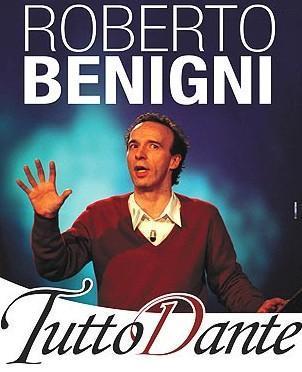
The first Canto on YouTube (1 hour)
http://www.youtube.com/watch?v=NVI7Aw...
I wish I could understand more Italian than a few words here and there but it sounds like a stand-up performance with satirical commentary on Italian politics & society using Dante's Commedia references. Clearly Dante is still alive and kicking in Italian popular culture!
Here's a bit of info in English:
The show is Roberto’s unique creation, a fascinating voyage that extends from current events (cultural and political) to the Divine Comedy, from moments of pure humor to moments of breathtaking poetry--in particular Canto V° from The Inferno, Dante’s cosmos-bestriding, medieval epic of sin, salvation and the everlasting.
http://itallang.stanford.edu/othereve...
 Princeton Dante Project
Princeton Dante Project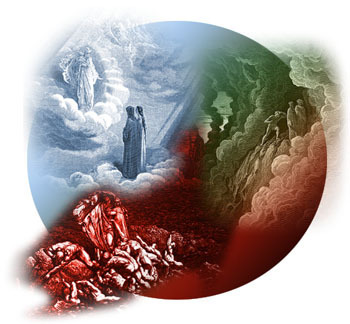
http://etcweb.princeton.edu/dante/pdp/
Lectures and multimedia material, in particular audio recordings of each canto in English or in Italian (squeee!).
 Librivox - La Divina Commedia
Librivox - La Divina CommediaFree audio recording in Italian (by non-professionals)
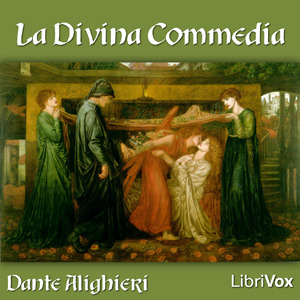
https://librivox.org/la-divina-commed...
 I thought there was a thread for references and resources on The Commedia, but since I don't find one tonight, I'll post this here:
I thought there was a thread for references and resources on The Commedia, but since I don't find one tonight, I'll post this here:Dante: Poet of the Secular World by Erich Auerbach
You may recognize Auerbach as author of the highly respected Mimesis: The Representation of Reality in Western Literature.
 Not as humorous as the Thug's reviews of some other classics, but worthy of a smile, and he does summarize some key highlights -- be aware, includes a few plot points throughout The Inferno.
Not as humorous as the Thug's reviews of some other classics, but worthy of a smile, and he does summarize some key highlights -- be aware, includes a few plot points throughout The Inferno.http://www.youtube.com/watch?v=4LYC7H...
 http://www.youtube.com/watch?v=SyYrQd...
http://www.youtube.com/watch?v=SyYrQd...I haven't watched more than a few opening moments, so can't really comment on the worth or lack thereof for this animated film of The Inferno. Those few moments did show that it deviates substantially from the poem.
The Uncanonical Dante: The Divine Comedy And Islamic Philosophy
Paul A. Cantor
"Dante was in fact accused of being an Averroist, 23 and he refers to Averroës directly and indirectly several times in his writings. Sometimes he speaks of Averroës approvingly and even cites him as an authority he accepts, sometimes he appears to be critical of Averroës, but even just to mention him by name was a daring act in Dante's day. Averroës was most famous, or rather infamous, for his understanding of the human soul, worked out in terms ultimately derived from Aristotle, the Possible and the Active Intellects. This subject is extremely complicated and obscure, 24 deliberately so because of its dangerously unorthodox implications."
"The sequence Aristotle-Averroës-Dante may serve as an emblem of the complex interactions that have taken place over the [End Page 147] centuries between Western and non-Western cultures. Islamic culture is certainly categorized as non-Western in today's debates, but as shown by the case of Averroës (as well as other Islamic philosophers such as Alfarabi), Islamic thought was profoundly rooted in the very Greek world that is at the fountainhead of Western culture."
"To today's opponents of the canon, I would thus say: "Instead of rejecting the Western canon, study it carefully, and you will find that it is not exclusively Western after all. The situation is in fact far more complex than you realize, and studying classics like the Divine Comedy or Don Quixote may well introduce you to issues that have been quite central in what you yourselves think of as non-Western cultures, issues to the understanding of which non-Westerners have made major contributions."
http://www.muslimphilosophy.com/ip/tu...
Paul A. Cantor
"Dante was in fact accused of being an Averroist, 23 and he refers to Averroës directly and indirectly several times in his writings. Sometimes he speaks of Averroës approvingly and even cites him as an authority he accepts, sometimes he appears to be critical of Averroës, but even just to mention him by name was a daring act in Dante's day. Averroës was most famous, or rather infamous, for his understanding of the human soul, worked out in terms ultimately derived from Aristotle, the Possible and the Active Intellects. This subject is extremely complicated and obscure, 24 deliberately so because of its dangerously unorthodox implications."
"The sequence Aristotle-Averroës-Dante may serve as an emblem of the complex interactions that have taken place over the [End Page 147] centuries between Western and non-Western cultures. Islamic culture is certainly categorized as non-Western in today's debates, but as shown by the case of Averroës (as well as other Islamic philosophers such as Alfarabi), Islamic thought was profoundly rooted in the very Greek world that is at the fountainhead of Western culture."
"To today's opponents of the canon, I would thus say: "Instead of rejecting the Western canon, study it carefully, and you will find that it is not exclusively Western after all. The situation is in fact far more complex than you realize, and studying classics like the Divine Comedy or Don Quixote may well introduce you to issues that have been quite central in what you yourselves think of as non-Western cultures, issues to the understanding of which non-Westerners have made major contributions."
http://www.muslimphilosophy.com/ip/tu...
 ReemK10 (Paper Pills) wrote: "The Uncanonical Dante: The Divine Comedy And Islamic Philosophy
ReemK10 (Paper Pills) wrote: "The Uncanonical Dante: The Divine Comedy And Islamic Philosophy Paul A. Cantor
"Dante was in fact accused of being an Averroist, 23 and he refers to Averroës directly and indirectly several tim..."
Some of our Philosophy profs would love you to come do battle during our Core Curriculum revision! And then you can hang with some of us in our dept, who wish to keep some semblance of the canon/tradition, in order to provide a framework which explains what modern texts are in dialogue with.
Linda wrote: "ReemK10 (Paper Pills) wrote: "The Uncanonical Dante: The Divine Comedy And Islamic Philosophy
Paul A. Cantor
"Dante was in fact accused of being an Averroist, 23 and he refers to Averroës direc..."
Linda, you are too sweet!! I which I were qualified to take part in any sort of curriculum revision, let alone in a philosophy department. You made my day by even suggesting this! :)
Paul A. Cantor
"Dante was in fact accused of being an Averroist, 23 and he refers to Averroës direc..."
Linda, you are too sweet!! I which I were qualified to take part in any sort of curriculum revision, let alone in a philosophy department. You made my day by even suggesting this! :)
 Gustave Doré: L'imaginaire au Pouvoir
Gustave Doré: L'imaginaire au PouvoirGustave Doré (1832–1883): Master of Imagination
18 February - 11 May 2014, Musée d'Orsay (Paris)
http://www.musee-orsay.fr/en/events/e...

The exhibition will also be shown at the National Gallery of Canada, Ottawa, 12 June - 14 September 2014
Very good online exhibition:
http://expositions.bnf.fr/orsay-gusta...
(sadly only in French at the moment but the exhibition just opened and they usually have them in English too...)
Little animated film by the Musée d'Orsay:
http://www.youtube.com/watch?v=4yd1lR...
 Dante for fun: kids books that retell the Inferno, Purgatorio and Paradiso
Dante for fun: kids books that retell the Inferno, Purgatorio and Paradisohttp://boingboing.net/2014/02/18/dant...
Florence, Dante’s home town, is still proud of its native son
In Search of Dante's Florence
http://www.washingtonpost.com/lifesty...
In Search of Dante's Florence
http://www.washingtonpost.com/lifesty...
 Very good article. Thanks Reem.
Very good article. Thanks Reem. I couldn't get the photo gallery to work so I looked up the figure of the three-headed Satan inside the baptistery:

http://www.florenceinferno.com/baptis...
And I loved the anecdote of the little turf war between Florence and Ravenna regarding Dante's remains:
For centuries, the city of Ravenna, where Dante died in 1321, has refused to give up his bones — even resorting to hiding them when Pope Leo X, at the suggestion of Michelangelo, ordered their return to Florence in 1519. Florence, after all, only got around to lifting that death sentence against Dante in 2008.
 Museo Casa di Dante in Florence
Museo Casa di Dante in FlorenceFlorence's Dante museum (not Dante's house, which no longer exists)
http://www.museocasadidante.it/
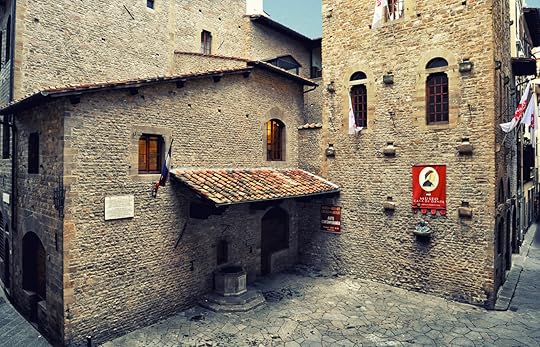
The Casa di Dante, which houses the Dante Museum, is a great way to get the feel of how a typical nobleman lived in the 1200s. The museum doesn’t have any Dante artifacts, but there’s a fascinating painting showing the city as it would have looked in Dante’s day, with its forest of towers and the Ponte Vecchio spanning the Arno. (from the Washington Post article linked by Reem)
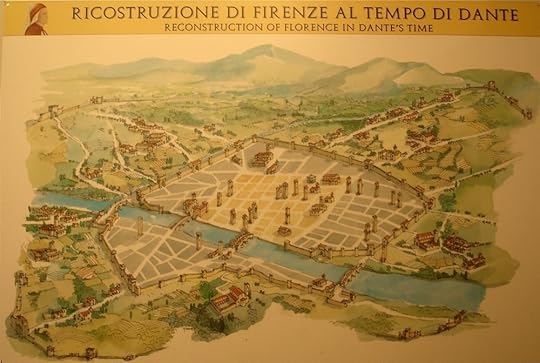
Reconstruction of Florence in Dante's time
http://www.pileface.com/sollers/IMG/j...
 Florence Inferno
Florence InfernoBlog about "the Florentine mysteries, symbols, and places that are mentioned in 2013 Dan Brown’s novel Inferno" (includes some good posts about Dante)
http://www.florenceinferno.com/
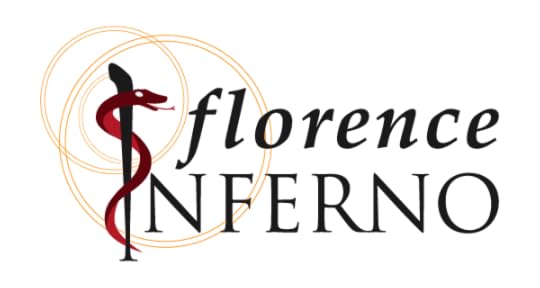
Post on Paintings & Artists inspired by Dante's Inferno (Botticelli, Stradanus, Blake, Doré, Bouguereau, Rodin, Von Bayros, Dali):
http://www.florenceinferno.com/artworks/
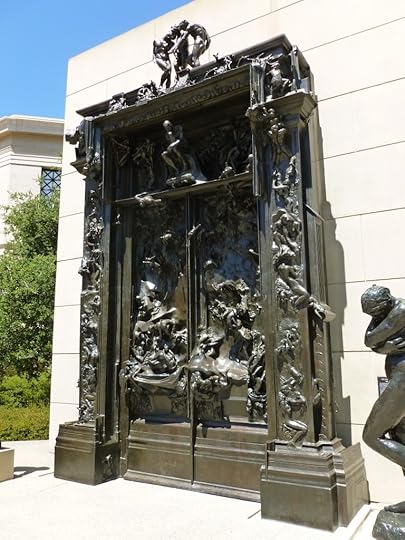
Rodin's Gates of Hell
A little curiosity: post on Dante's Death Mask:
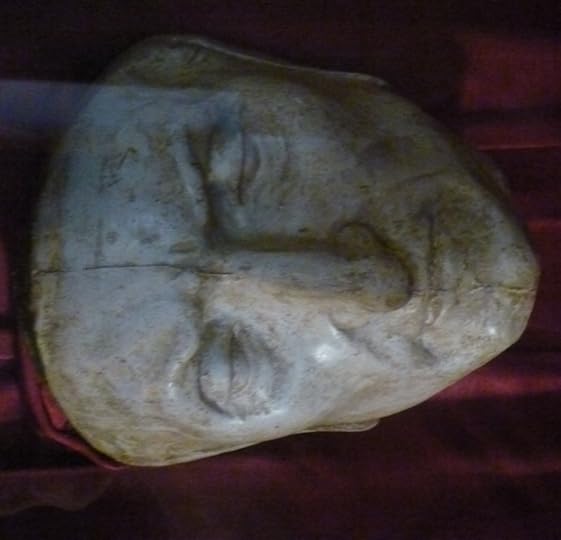
http://www.florenceinferno.com/dante-...
Book Portrait wrote: "Very good article. Thanks Reem.
I couldn't get the photo gallery to work so I looked up the figure of the three-headed Satan inside the baptistery:
http://www.florenceinferno.com/baptis......"
Book Portrait try this link to see if it works for you:
http://www.washingtonpost.com/lifesty...
(I can't keep up with all your links, but I'm trying!!!)lol
I couldn't get the photo gallery to work so I looked up the figure of the three-headed Satan inside the baptistery:
http://www.florenceinferno.com/baptis......"
Book Portrait try this link to see if it works for you:
http://www.washingtonpost.com/lifesty...
(I can't keep up with all your links, but I'm trying!!!)lol
 ReemK10 (Paper Pills) wrote: "Book Portrait try this link to see if it works for you:
ReemK10 (Paper Pills) wrote: "Book Portrait try this link to see if it works for you:http://www.washingtonpost.com/lifesty...
(I can't keep up with all your links, but I'm trying!!!)lol"
Thanks Reem. It's still not working (I see the WP loading and then nothing); I'm probably missing a plug-in. No worries, I can keep myself occupied... ^^
LOL. Don't worry there's not much to see at Casa di Dante (unless I missed it!). :)
Thais is a courtesan in Terence's comic play Eunuchus, and had a reputation even into the Middle Ages as a flaterer: Taide in Inferno 18 and Terence Eunuchus 937
http://jps.library.utoronto.ca/index....
http://jps.library.utoronto.ca/index....
 ReemK10 (Paper Pills) wrote: "Thais is a courtesan in Terence's comic play Eunuchus, and had a reputation even into the Middle Ages as a flaterer: Taide in Inferno 18 and Terence Eunuchus 937
ReemK10 (Paper Pills) wrote: "Thais is a courtesan in Terence's comic play Eunuchus, and had a reputation even into the Middle Ages as a flaterer: Taide in Inferno 18 and Terence Eunuchus 937http://jps.library.utoronto.ca/index......."
It is such fun when a text is venerable (and complex) enough to collect commentary across centuries! (I have a couple of acquaintances who can trade Biblical interpretations on the New Testament going back at least to Origen.) I liked that John Crane footnotes (9) Dorothy Sayer for her comment on Dante's focus here in Malebolge on "the prostitution of words" (versus of flesh). (Lust is back in upper Hell?) It feels almost post-modern -- and sacred text at the same time.
I hope some of you are enjoying the access to commentary on the Danteworld pages. (The correct site? It reaches back into the repository at Dartmouth, at least if I am guessing at all correctly on the interconnections of resources.)
Thanks for this link, RK10.
:) Lily
Kalliope recommended this book to me:
The Arabic Role in Medieval Literary History: A Forgotten Heritage (The Middle Ages Series)
http://www.amazon.com/Arabic-Role-Med...
I ordered the book, and it arrived today. I will share parts with you all as I read.
In the meantime, I found this video by the author if you'd like to have a look. I haven't seen it yet.
http://link.brightcove.com/services/p...
Kalliope recommended this book to me:
The Arabic Role in Medieval Literary History: A Forgotten Heritage (The Middle Ages Series)
http://www.amazon.com/Arabic-Role-Med...
I ordered the book, and it arrived today. I will share parts with you all as I read.
In the meantime, I found this video by the author if you'd like to have a look. I haven't seen it yet.
http://link.brightcove.com/services/p...
 ReemK10 (Paper Pills) wrote: ":) Lily
ReemK10 (Paper Pills) wrote: ":) LilyKalliope recommended this book to me:
The Arabic Role in Medieval Literary History: A Forgotten Heritage (The Middle Ages Series)
http://www.amazon.com/Arabic-Role-Med......"
I just checked the book out at Amazon and thought the thesis sounded familiar. I read The Ornament of the World: How Muslims, Jews, and Christians Created a Culture of Tolerance in Medieval Spain, by the same author, last year and really enjoyed it. I'll have to add this one to the ever-expanding list although it pre-dates the book I've read and her ideas may have been included in it.
 Sue wrote: "...I read The Ornament of the World: How Muslims, Jews, and Christians Created a Culture of Tolerance in Medieval Spain, by the same author, last year and really enjoyed it. ..."
Sue wrote: "...I read The Ornament of the World: How Muslims, Jews, and Christians Created a Culture of Tolerance in Medieval Spain, by the same author, last year and really enjoyed it. ..."I just checked the description of that book, Sue. I found this sentence tantalizing: "Combining the best of what Muslim, Jewish, and Christian cultures had to offer, al-Andalus and its successors influenced the rest of Europe in dramatic ways, from the death of liturgical Latin and the spread of secular poetry, to remarkable feats in architecture, science, and technology."
Particularly relevant seemed "the death of liturgical Latin and the spread of secular poetry." I don't believe I've ever thought about the possible connections between the "death" of a (liturgical?) language and the spread of secular ones as possible significant factors in the transition from a medieval world to the Renaissance and Reformation. I don't know what scholars say on the topic. If there is a correlation, and given the power of language, it seems plausible, certainly here is irony in Dante's poetry. (I have been listening to the Great Courses series on medieval literature, which positions Dante, Petrarch, and Boccaccio as the triumvirate bringing great versatility to the Italian language for capturing reality and imagination -- poetry, intellectual and philosophical manipulation, dialog and story and ultimately the careful observations associated with science.)
 Lily wrote: "Sue wrote: "...I read The Ornament of the World: How Muslims, Jews, and Christians Created a Culture of Tolerance in Medieval Spain, by the same author, last year and really enjoyed i..."
Lily wrote: "Sue wrote: "...I read The Ornament of the World: How Muslims, Jews, and Christians Created a Culture of Tolerance in Medieval Spain, by the same author, last year and really enjoyed i..."This is a book I want to read again and an area I would like to learn more about. The growth of the vernacular was a fascinating time. Until then, knowledge was really housed in the formal languages but this was changing. I am not a linguist at all. I was an English major way back when and found fascinating the references to the beginnings of the popular ballads, etc.
Posting this as a resource to be consulted. Check out the table of contents so no spoilers are revealed.
Reading Dante's Stars:
http://www.yale.edu/yup/pdf/076797_fr...
Reading Dante's Stars:
http://www.yale.edu/yup/pdf/076797_fr...
Dante in a different voice
Audio book of Dante Alighieri's Divine Comedy in various translations (as noted by canto)
The audio book is a research product of students in the course "Humanities Research Lab" (HP298) at Boston College. The students' serialized "book" is suitable for undergraduates reading and studying Dante for the first time. It is an attempt to allow students to hear the poetry in a familiar way, in the voice of their contemporaries. The translations used are various, that of Hollander (Anchor and online at Princeton) or Musa (Penguin) or Ciardi (NAL, Mentor or Signet) or Durling (Oxford) or Sayers (Penguin), depending on individual choice. The web-based audio text is ready for use in Boston College Honors Program spring seminars in which, typically, Dante is encountered. There are many surprises hidden among these student read cantos as there are many unexpected pleasures in Dante's poem. Students have added audio tracks and image files to their recordings to good effect.
http://www.bc.edu/bc_org/avp/cas/ashp...
Audio book of Dante Alighieri's Divine Comedy in various translations (as noted by canto)
The audio book is a research product of students in the course "Humanities Research Lab" (HP298) at Boston College. The students' serialized "book" is suitable for undergraduates reading and studying Dante for the first time. It is an attempt to allow students to hear the poetry in a familiar way, in the voice of their contemporaries. The translations used are various, that of Hollander (Anchor and online at Princeton) or Musa (Penguin) or Ciardi (NAL, Mentor or Signet) or Durling (Oxford) or Sayers (Penguin), depending on individual choice. The web-based audio text is ready for use in Boston College Honors Program spring seminars in which, typically, Dante is encountered. There are many surprises hidden among these student read cantos as there are many unexpected pleasures in Dante's poem. Students have added audio tracks and image files to their recordings to good effect.
http://www.bc.edu/bc_org/avp/cas/ashp...
 A very good 6-min video presenting the beautiful manuscript of the Commedia kept at the Bodleain Library in Oxford (I paste its illustrations in the weekly threads):
A very good 6-min video presenting the beautiful manuscript of the Commedia kept at the Bodleain Library in Oxford (I paste its illustrations in the weekly threads):http://www.youtube.com/watch?v=PkUEs6...
The book is huge!
All the Commedia illustrations are available online:
Inferno: http://www.bodley.ox.ac.uk/dept/scwms...
Purgatorio: http://www.bodley.ox.ac.uk/dept/scwms...
Paradiso: http://www.bodley.ox.ac.uk/dept/scwms...
 Book Portrait wrote: "A very good 6-min video presenting the beautiful manuscript of the Commedia kept at the Bodleain Library in Oxford (I paste its illustrations in the weekly threads):
Book Portrait wrote: "A very good 6-min video presenting the beautiful manuscript of the Commedia kept at the Bodleain Library in Oxford (I paste its illustrations in the weekly threads):https://www.youtube.com/watch?v=PkUEs......"
Wonderful little video! Thank you, BP!
If it is easier to remember, the Bodleain manuscript illustrations are also available via "Gallery," "Links to other artists" at The World of Dante site:
http://www.worldofdante.org/gallery_m...
(It links to Inferno illustrations. At end of those are links for the other books.)
Book Portrait wrote: "A very good 6-min video presenting the beautiful manuscript of the Commedia kept at the Bodleain Library in Oxford (I paste its illustrations in the weekly threads):
http://www.youtube.com/watch?v..."
You're so good at finding visuals Book Portrait!Well done!
http://www.youtube.com/watch?v..."
You're so good at finding visuals Book Portrait!Well done!
 A short video (4 minutes) from the Khan Academy team on Rodin's Gates of Hell, loosely inspired by Dante's work:
A short video (4 minutes) from the Khan Academy team on Rodin's Gates of Hell, loosely inspired by Dante's work:http://smarthistory.khanacademy.org/r...
(see msg 28 for a photo of the sculpted doors)
Apparently the reproduction of The Thinker at the top of the doors is meant to be Dante himself!
ETA: The Musée d'Orsay page confirms it is Dante:
http://www.musee-orsay.fr/en/collecti...
 For a more detailed (and much better!) presentation of Rodin's Gates of Hell and how it was part of a renewed interest for Dante's poem in the nineteenth century, here's a 26-minute video:
For a more detailed (and much better!) presentation of Rodin's Gates of Hell and how it was part of a renewed interest for Dante's poem in the nineteenth century, here's a 26-minute video:in English: https://www.youtube.com/watch?v=LzbsZ...
in French (2 parts):
part 1: https://www.youtube.com/watch?v=TBiVy...
part 2: https://www.youtube.com/watch?v=BXMO-...
ETA: for pictures of all the individual sculptures on the door:
http://www.rodinmuseum.org/collection...
Books mentioned in this topic
The Ornament of the World: How Muslims, Jews, and Christians Created a Culture of Tolerance in Medieval Spain (other topics)The Ornament of the World: How Muslims, Jews, and Christians Created a Culture of Tolerance in Medieval Spain (other topics)
The Ornament of the World: How Muslims, Jews, and Christians Created a Culture of Tolerance in Medieval Spain (other topics)
Dante: Poet of the Secular World (other topics)
Mimesis: The Representation of Reality in Western Literature (other topics)


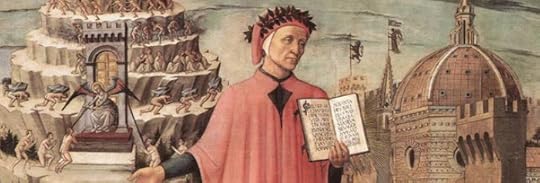


http://danteworlds.laits.utexas.edu/